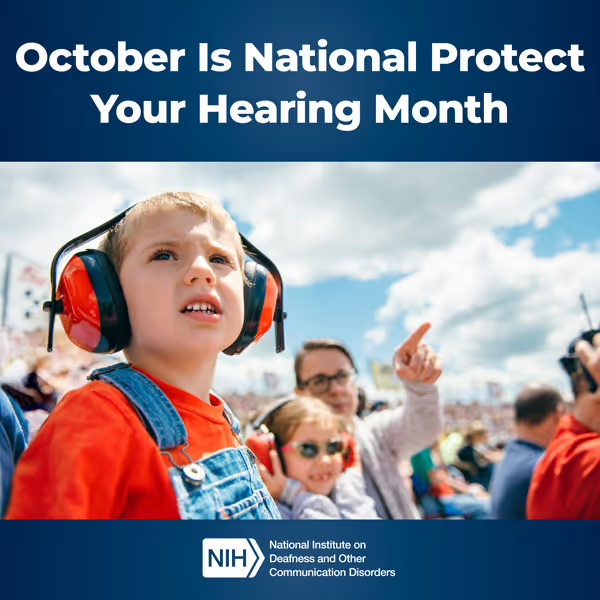Hearing loss is a pervasive health issue that affects millions of people in the United States and around the world. While many of us take our hearing for granted, it is a precious sense that allows us to communicate, experience music, and stay connected with our surroundings. The Centers for Disease Control and Prevention (CDC) recognizes the importance of raising awareness about hearing health, and that's why they support October as National Protect Your Hearing Month.
The Prevalence of Hearing Loss
Hearing loss is more common than you might think. According to the CDC, approximately 48 million Americans have some degree of hearing impairment. This number highlights the widespread nature of this issue. While hearing loss is often associated with aging, it can affect individuals of all ages, including children and young adults.
Causes of Hearing Loss
Hearing loss can be caused by various factors, including:
Noise Exposure: Prolonged exposure to loud noises, whether at work, during recreational activities, or from personal audio devices, is a leading cause of hearing loss. This type of hearing loss is often preventable with proper protection and awareness.
Aging: Age-related hearing loss, known as presbycusis, is a natural part of the aging process.
Genetics: Some people are genetically predisposed to hearing loss.
Illness and Infections: Certain illnesses and infections, such as meningitis or ear infections, can damage the structures of the ear and lead to hearing loss.
Medications: Certain medications can have ototoxic effects, causing damage to the inner ear and resulting in hearing loss.
The Impact of Untreated Hearing Loss
Hearing loss is not just an inconvenience; it can have profound effects on an individual's quality of life. Untreated hearing loss is linked to various adverse outcomes, including:
Communication Difficulties: Hearing loss can make it challenging to have conversations, leading to isolation and frustration.
Mental Health Issues: Hearing loss has been linked to an increased risk of depression and anxiety.
Cognitive Decline: Some studies suggest a potential link between untreated hearing loss and cognitive decline, including an increased risk of dementia.
Reduced Job Opportunities: Untreated hearing loss can have negative impacts on your career and opportunities for advancement.
Safety Concerns: Difficulty hearing alarms, sirens, and other warning sounds can pose safety risks both at home and in public.
National Protect Your Hearing Month - A Call to Action
Recognizing the importance of hearing health, the CDC supports National Protect Your Hearing Month (#NPYHM).This initiative aims to raise awareness about the causes of hearing loss, the importance of early detection, and the steps individuals can take to protect their hearing.
How You Can Protect Your Hearing
Use Hearing Protection: When exposed to loud noises, such as at concerts, while operating heavy machinery, or at sporting events, always wear hearing protection like earplugs or earmuffs.
Turn Down the Volume: When using personal audio devices, keep the volume at a safe level.
Get Regular Hearing Check-ups: Routine hearing screenings can detect problems early and help prevent further damage.
Educate Yourself: Learn more about hearing loss and its prevention to make informed choices about your hearing health.
Read more: Protect Your Ears: Tips to Prevent Hearing Loss
The Need for Hearing Health Awareness
Hearing loss is a significant public health concern in the United States, affecting millions of individuals of all ages. National Protect Your Hearing Month serves as a vital reminder of the importance of hearing health and the steps we can take to protect our hearing. By raising awareness, promoting prevention, and encouraging regular check-ups, we can work towards reducing the impact of hearing loss on individuals and communities across the nation. Take this opportunity to prioritize your hearing health and encourage others to do the same, because our ability to hear enriches our lives in countless ways, and it's worth preserving.
Read more from the CDC:
- National Protect Your Hearing Month: www.cdc.gov/nceh/features/protect-your-hearing-month
- LISTEN UP! PROTECT YOUR HEARING: www.cdc.gov/nceh/hearing_loss/infographic/
- Noise and Occupational Hearing Loss: www.cdc.gov/niosh/topics/noise
Disclaimer:
The information contained in this article shall neither be considered as nor replace professional health or medical advice and is for educational and informational purposes only. Always consult a physician or other qualified health provider regarding any questions or concerns you may have about your hearing or medical conditions.
